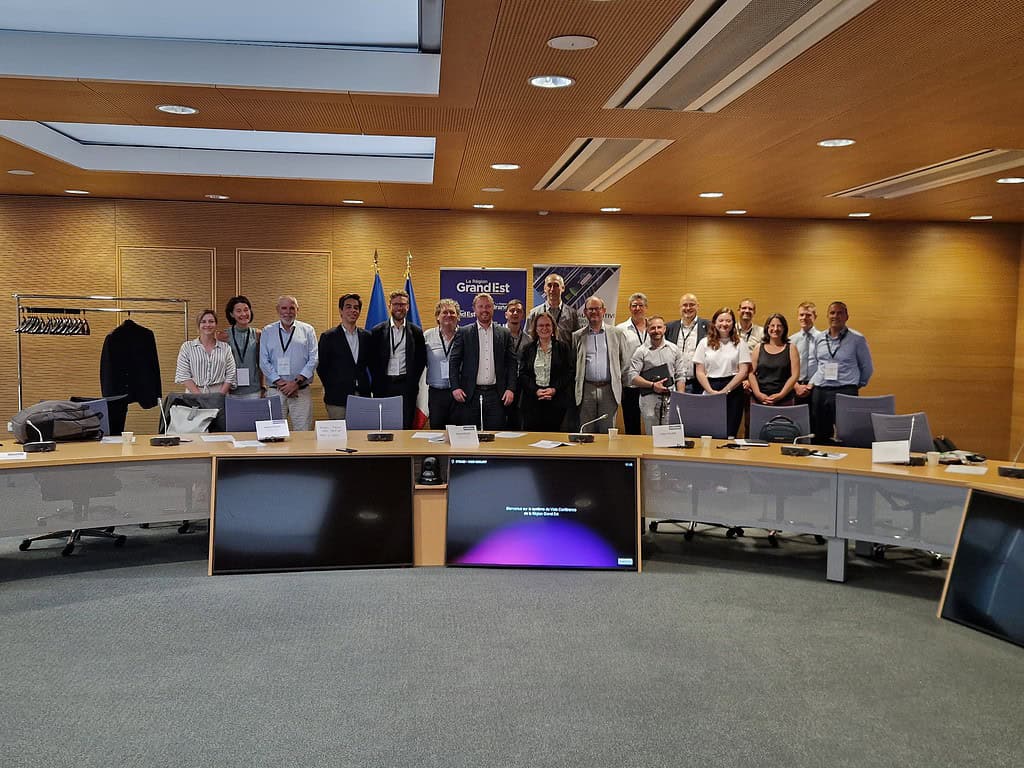The region of Grand Est, in collaboration with the Automotive Skills Alliance (ASA), held a successful two-day study visit in Grand Est on June 27-28, 2024. The conference and the study visit aimed at exploring the future of upskilling and reskilling in the automotive industry and brought together key stakeholders, including industry leaders, regional officials, and education experts, with a focus on the hands-on visit of the Renault Sovab and training facilities in the region.
The event started with a welcome address from Jakub Stolfa, President of the ASA, and Valérie Debord, Vice-President in charge of Employment, Training, Guidance, and Apprenticeships of Grand Est.
Julien Leclerc, Head of the Regional Employment & Training Observatory (OREF Grand Est), provided key insights into the automotive industry in the region, setting the stage for the first roundtable discussion. The session focused on national and regional strategies for supporting skill changes in the automotive industry. Panellists included Caroline Cohen from The Automotive Platform (PFA), Alexis Saccardo from Mobilians Grand Est, Sylvie Albrecht from ANFA, Angélique Alberti from DREETS Grand Est, and Claire Coudy from the Grand Est Region.
The afternoon roundtable focused on support for companies and public training, with contributions from Didier Neu, Project Manager at the Vehicle of the Future Competitiveness Cluster, Katia Allard, Operational Director at the Campus of Profession and Qualifications, and Aline Wagner, Project Manager at the Grand Est Region
The second half of the visit consisted of a tour of the Renault Sovab production site in Batilly, where the participants were introduced to employee skills development and training practices of Renault and experienced a full site visit including the training facilities, for example, car battery troubleshooting training station. The delegation then visited the André Citroën Vocational School in Marly, where they exchanged with trainers and students involved in car maintenance training courses.
Valérie Debord, Vice-President in charge of Employment, Training, Guidance, and Apprenticeships said: “Facing the twin transition in regions, we must rethink the entire industrial chain in terms of skills and competencies. As regions, our objective is to accompany the transition and help anticipate the changes by engaging with sectoral partners at all levels. This is why it is essential to have regions at the center of the transformation process transformation.”
Jakub Stolfa, President of the ASA said: “Collaboration at the regional level is key, along with industry, social partners, and education and training providers. Our work in ASA helps support the twin transition, thanks to all partners working together at all levels – European, national and especially regional. A study visit to Grand Est helps exchange ideas among partners and plan further actions together. There is no need to reinvent the wheel when there are so many good examples to be shared among partners.“
Julien Leclerc, Head of the Regional Employment & Training Observatory said: “In Grand Est, automotive jobs account for twice the average compared to most other French regions. At least 58,000 jobs here are tied to the automotive industry. There is a gap between the jobs we have and the jobs we need. It is essential to remain agile in adjusting education and training.“
Background
The Automotive Skills Alliance (ASA) is the large-scale Pact for Skills Partnership and is dedicated to fostering skills development in the Automotive-Mobility ecosystem. The Grand Est region, known for its robust automotive sector, provides an ideal setting for exploring innovative training and upskilling strategies. This study visit builds on the success of the previous event held in Stuttgart, continuing the ASA’s mission to support the industry’s transformation.
Contact: office@skills-alliance.eu.


Funded by the European Union. Views and opinions expressed are however those of the author(s) only and do not necessarily reflect those of the European Union or the European Education and Culture Executive Agency (EACEA). Neither the European Union nor EACEA can be held responsible for them.
